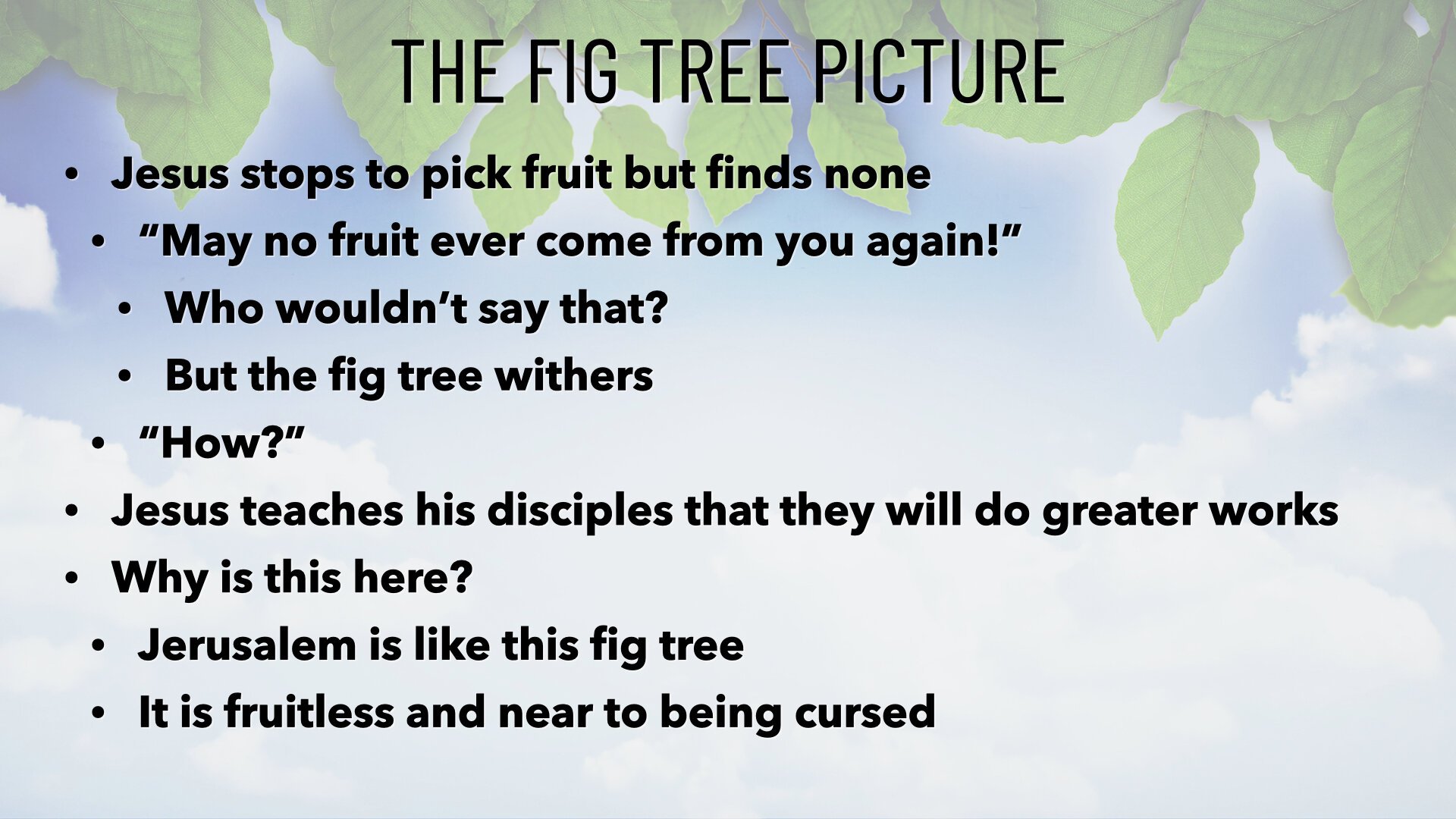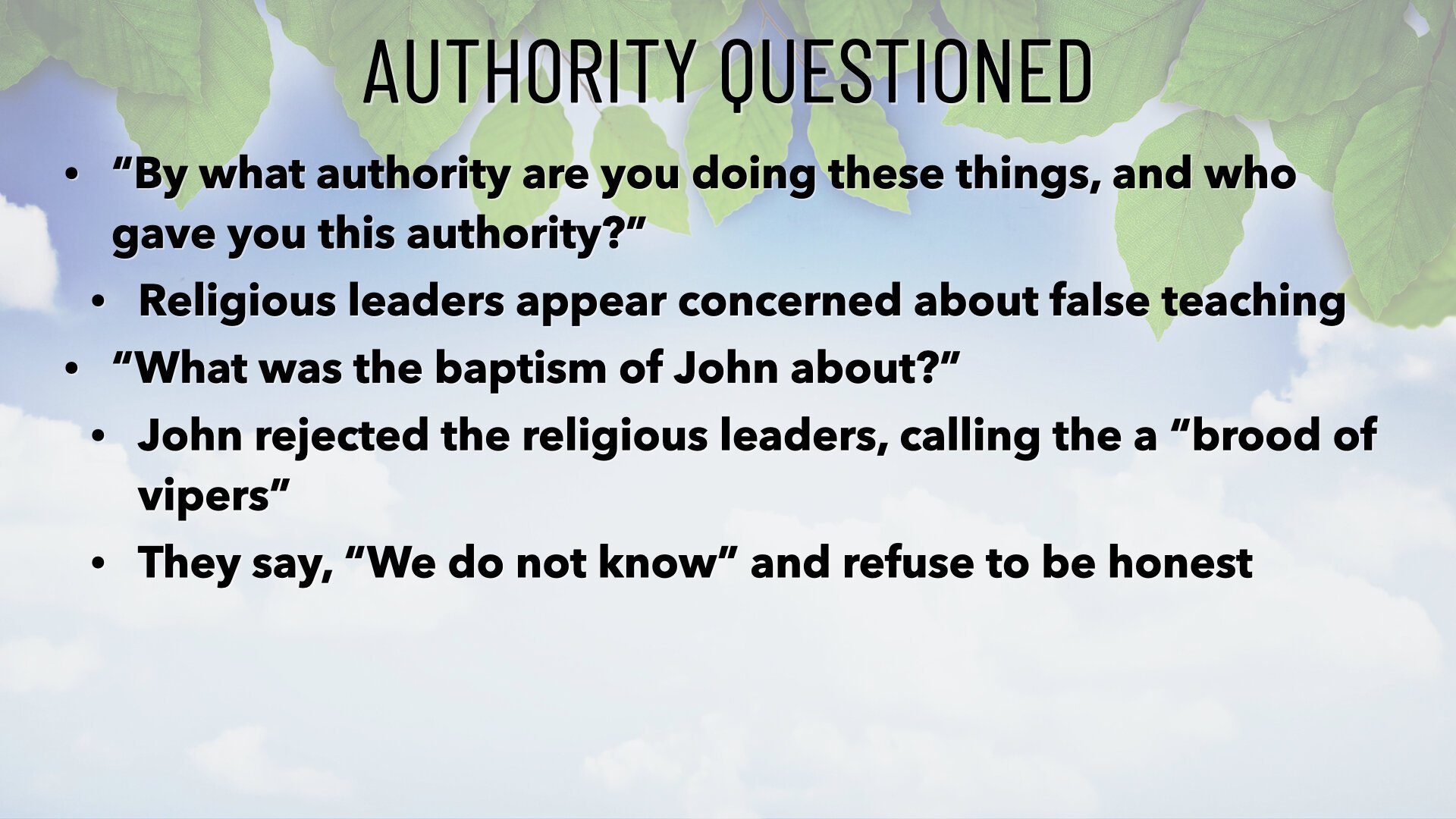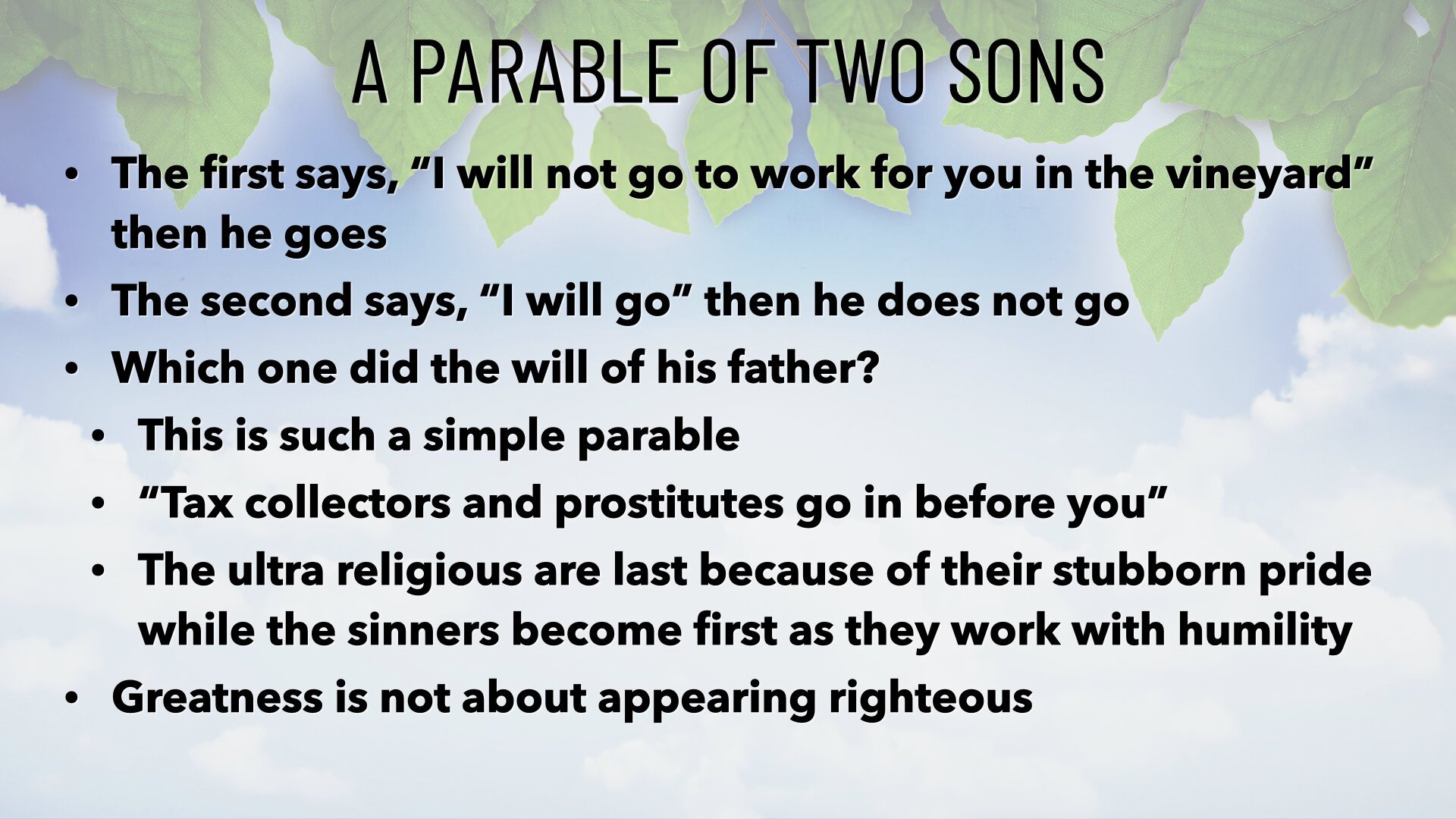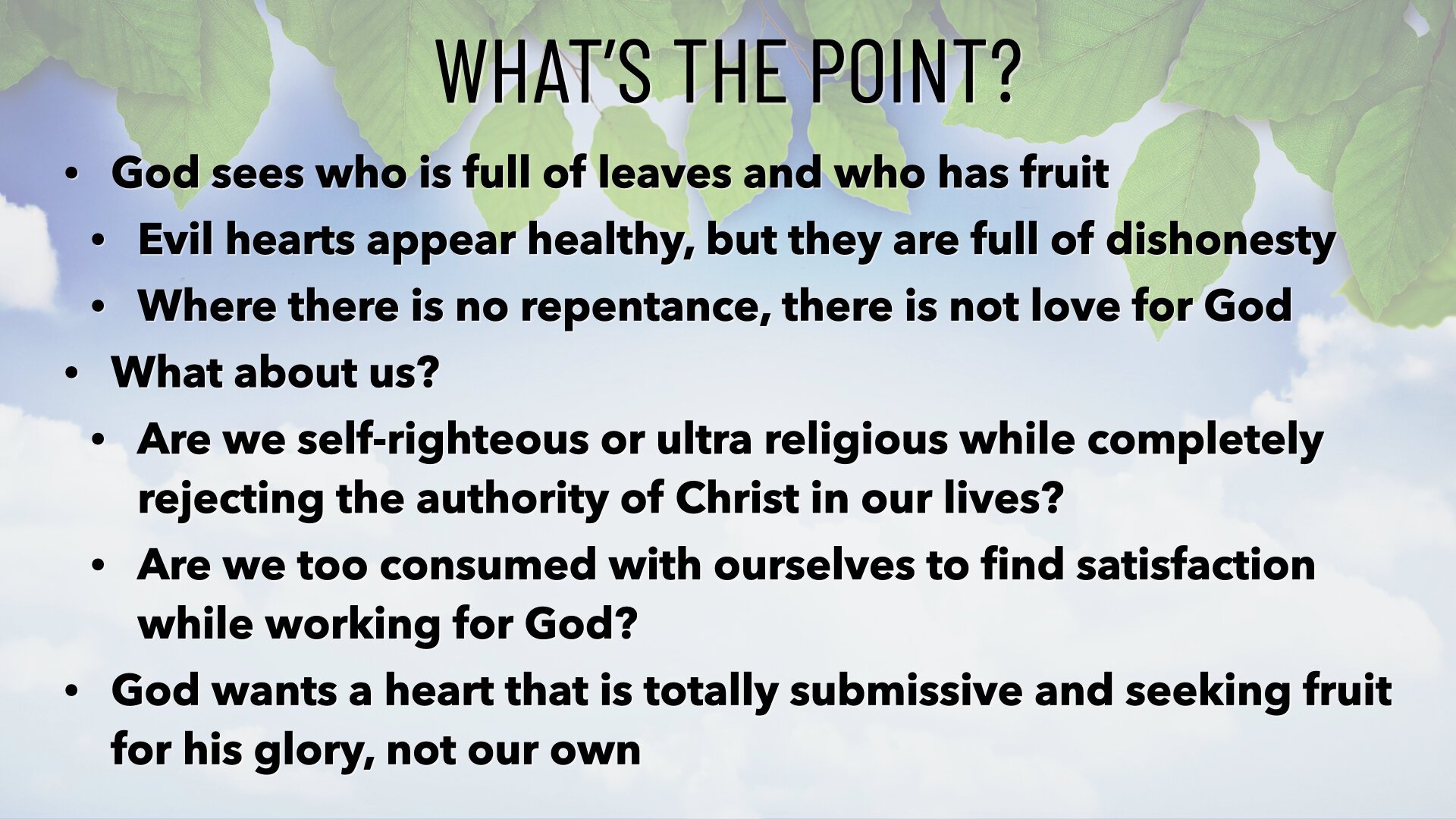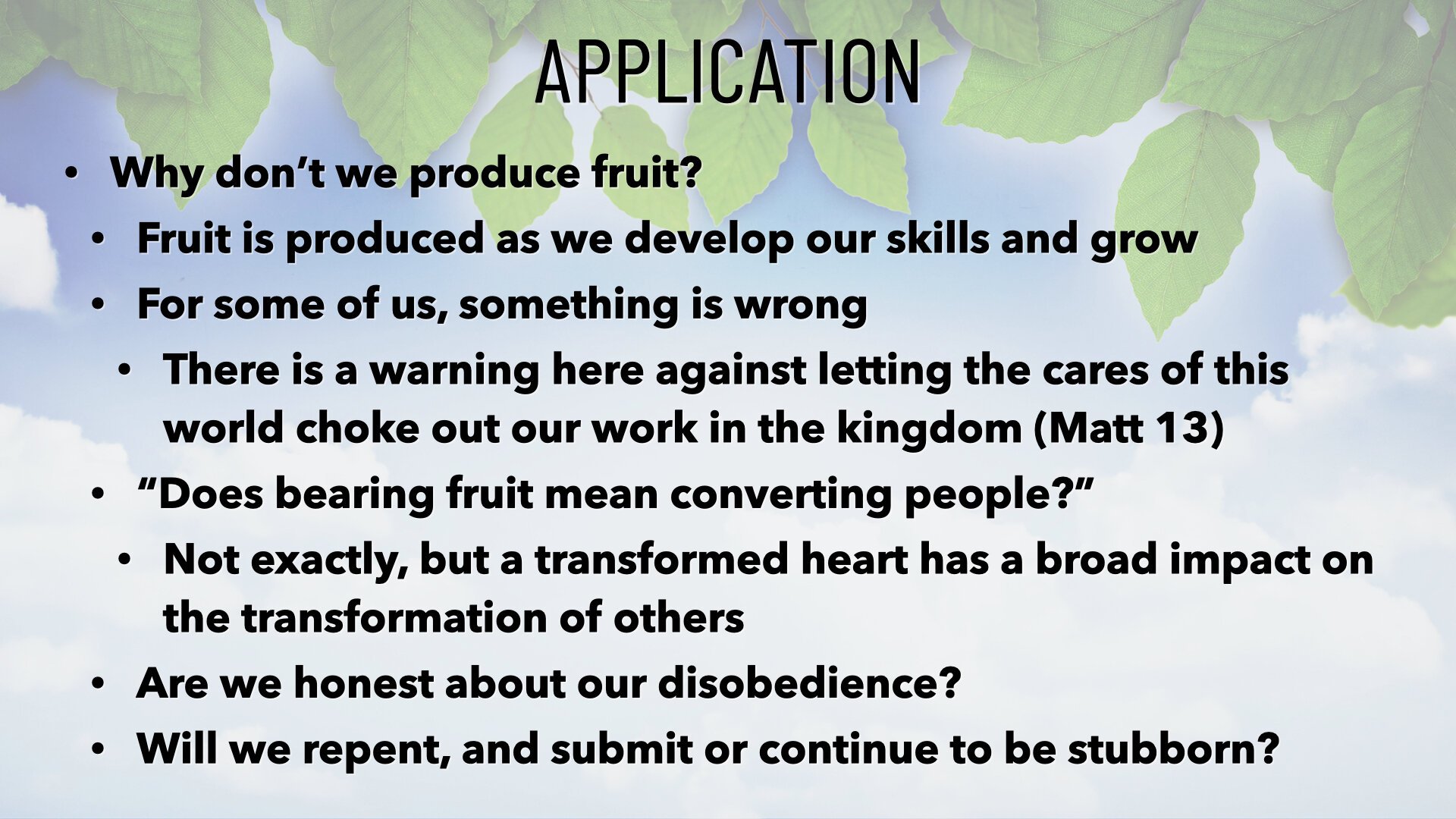Just Leaves (Matthew 21:18-32)
How productive are you in the kingdom of God? This is not a question that I ask lightly. I'm not asking this question to bash you for not doing enough. I have no idea how much work you are doing, but I imagine a lot of work going on behind the scenes. As we continue our study of Matthew 21, this quickly becomes a critical question that we must all answer. Maybe there are some here who aren't working. Is that you? Why aren't you working, and what is God going to do about it?
Jesus has gloriously entered Jerusalem. Those who see him coming riding on a colt cry out, "Hosanna to the Son of David." They call for Jesus to save them, so Jesus goes into the temple to address the corrupt religious system established there. While he is there, some children cry out again, "Hosanna to the Son of David." But the chief priests and elders say, "Why are you not stopping them from saying this?" Jesus responds by saying, "Have you not read, 'Out of the mouth of infants and nursing babies you have prepared praise?'" Then, he leaves the temple and returns to Bethany.
The Fig Tree Picture (21:18-22)
Matthew 21:18--22 (ESV) --- 18 In the morning, as he was returning to the city, he became hungry. 19 And seeing a fig tree by the wayside, he went to it and found nothing on it but only leaves. And he said to it, “May no fruit ever come from you again!” And the fig tree withered at once. 20 When the disciples saw it, they marveled, saying, “How did the fig tree wither at once?” 21 And Jesus answered them, “Truly, I say to you, if you have faith and do not doubt, you will not only do what has been done to the fig tree, but even if you say to this mountain, ‘Be taken up and thrown into the sea,’ it will happen. 22 And whatever you ask in prayer, you will receive, if you have faith.”
The next day, he starts back toward Jerusalem, but he stops along the way because he gets hungry. When he sees a fig tree alongside the road full of leaves, he stops to get some figs. Fig trees were not generally in bloom this time of year, but if it has leaves, it should have figs. That's the way fig trees work. Jesus is hungry, so he goes over to get some breakfast. When he gets there, he finds out that the fig tree is empty and becomes angry. He curses the fig tree saying, "May no fruit ever come from you again." Doesn't that sound like something we would say in the morning before our breakfast and coffee? But when Jesus does it, something remarkable happens. The fig tree withers noticeably in front of the disciples, and they are blown away. They ask him, "How did the fig tree wither like that?" Jesus tells them that God will allow them to work much greater miracles than that if they have faith and do not doubt. He will give them whatever they ask in prayer if they have faith.
This is an odd event. Why would Jesus curse a tree for not having any fruit? Is Jesus hangry? The point of this event is not to demonstrate how Jesus hates empty fig trees. Jesus is giving us a picture to illustrate everything that is about to happen in the following chapters. Jerusalem is like this fig tree. It's just a bunch of leaves with no fruit. As he enters the city, we will see that the leaders appear to be righteous, but they refuse to submit to their Messiah. They are fruitless and near to being a curse. By the end, we will Jesus judge Jerusalem just like the fig tree as he foretells its destruction.
Authority Question (21:23-27)
Matthew 21:23--27 (ESV) --- 23 And when he entered the temple, the chief priests and the elders of the people came up to him as he was teaching, and said, “By what authority are you doing these things, and who gave you this authority?” 24 Jesus answered them, “I also will ask you one question, and if you tell me the answer, then I also will tell you by what authority I do these things. 25 The baptism of John, from where did it come? From heaven or from man?” And they discussed it among themselves, saying, “If we say, ‘From heaven,’ he will say to us, ‘Why then did you not believe him?’ 26 But if we say, ‘From man,’ we are afraid of the crowd, for they all hold that John was a prophet.” 27 So they answered Jesus, “We do not know.” And he said to them, “Neither will I tell you by what authority I do these things.
When Jesus enters the temple, the chief priests and elders come up to him while he is teachings, and they ask him, "By what authority are you doing these things, and who gave you this authority?" You see, these men are a part of the Sanhedrin. They are the ones who issue diplomas of ordination. They have control over what the schools teach. Someone coming in and teaching like Jesus goes entirely against their methodology for keeping out false teachers.
Jesus oddly answers them. Instead of just telling them that he is from God, Jesus asks them, "Where did the baptism of John come from, heaven or man?" When John was baptizing in the wilderness, he called the religious leaders a brood of vipers. John did not welcome them because they did not seek God. They seek their own glory. Once again, they refuse to accept John because they want to appear righteous to the people. But Matthew gives us a little more insight into what is going on. If they say it was from man (what they believe), they won't agree with them. If they say it is from heaven, then Jesus will say, "Why didn't you believe him?" So they tell Jesus, "We do not know." This is their way of being politically correct. Jesus refuses to tell them where his authority comes from.
If the religious leaders were open, honest, and transparent, they would have let everyone know their beliefs about John. They would have explained what they believe. They would have been wrong, but they would have been honest. Jesus can work with wrong people, but he cannot work with people who are dishonest and wrong. Their heart is desiring evil and not good.
Empty Words (21:28-32)
Matthew 21:28--32 (ESV) --- 28 “What do you think? A man had two sons. And he went to the first and said, ‘Son, go and work in the vineyard today.’ 29 And he answered, ‘I will not,’ but afterward he changed his mind and went. 30 And he went to the other son and said the same. And he answered, ‘I go, sir,’ but did not go. 31 Which of the two did the will of his father?” They said, “The first.” Jesus said to them, “Truly, I say to you, the tax collectors and the prostitutes go into the kingdom of God before you. 32 For John came to you in the way of righteousness, and you did not believe him, but the tax collectors and the prostitutes believed him. And even when you saw it, you did not afterward change your minds and believe him.
In this parable, Jesus tells us that a man goes to two sons to tell them to work in the vineyard. The first says, "I will not." He appears to be rebellious in heart, but later, he changes his mind and goes to work in the vineyard. The second says, "I will go." Then, he went off and did something totally different from what his father commanded him to do. It is at this point, Jesus feels the need to test his listeners. He asks, "Which one did the will of his father?" They all get the answer right. The one who changed his mind and went to work in the vineyard obeyed. These are the ones who produced fruit.
After they answered, Jesus explained the parable to them. The first son is the tax collectors and prostitutes. They started in disobedience, but now they want to submit and do their Heavenly Father's will. The second son represents the disobedient leaders who are rejecting Jesus. They can bear no fruit because they are unwilling to enter the kingdom God is bringing them through Jesus. He says, "Even when you saw that the prostitutes and tax collectors are obeying God, you did not change and believe me." The result is that the tax collectors and prostitutes will now be first in the kingdom because they believed first and submitted to God. They were last, but they are now first.
Isn't that interesting? The ultra-religious is stubborn and rebellious, while vile sinners are obedient and forgiven. The sinners become the most fruitful, and they enter the kingdom FIRST. Notice that phrase. The last will be FIRST and the first last. God is not interested in men and women who openly call themselves his children while living in complete disobedience. God is looking for true believers who submit to God's Messiah. Speaking words of obedience is empty and fruitless. God wants a working faith.
What's The Point?
God sees right through the facade. He is not fooled. When he comes to look for fruit, he finds none in those who are ultra-religious while being completely disobedient. Appearing righteous is not fruitful. God wants more. The evil heart wants to appear healthy while being full of dishonesty. They are not repentant, and they do not love God.
What about us? Do we desire evil? Would we rather have the praise of men and the appearance of righteousness more than true righteousness? This is how we can connect this story to the fig tree. These religious leaders are dishonest because they are more concerned about looking like a healthy fig tree than actually being a healthy fig tree. Righteousness and producing fruit for God is not about "Fake it till you make it." It's not about appearing to have your life together. When we act like we are pleasing God without really pleasing God, we are hypocrites.
Those who appear righteous while being dishonest are refusing to submit to Jesus' authority. As a result, they will never produce fruit for God in this state because they are concerned about our own glory. God is not with us in our work. He is not glorified in us because we are not satisfied with him. We seek satisfaction in appearing righteous! This is such a massive part of the religious world today. God wants a heart that is submissive to him and seeking his glory more than our own. He works through that heart to produce fruit for his glory.
Application
Someone here today might hear all of this and get depressed. Maybe you look at your life and don't see much fruit. Some of us are in the process of spiritual growth. The seed is being watered, and the root system is developing. Fruit doesn't just come up immediately. It takes time to develop in most of us. But if you have been a Christian for many years and you see no noticeable fruit in your life, what's wrong? Is there something we can do to help you grow and be more productive in the kingdom?
I remember hearing sermons about fruit and wondering what that really means. Does bearing fruit mean bringing people to Christ? It might if that is the work God has given you to do. But it could also mean teaching people who are in Christ or even encouraging them in some way. When Paul lists out the works we all can do, he does not just list one work. He uses very general terms that encompass every form of work that might be needed in the kingdom. We need inviters, Bible students, Bible class teachers, people who show hospitality, people who send cards to sick people, people who send cards to visitors, and people who talk to those who no one talks to. The list of works in our congregation is more numerous than we can list. But in every work, there is fruit produced as our skills develop. If someone is converted from outside, it's not going to be because I preached a good sermon. It's going to be because we worked together to help a lost soul find Christ. If the church here is thriving and growing stronger, it's not because of one person. It's because we are all working together to glorify our God. Every part has to do its share. That's what Jesus wanted to find in Jerusalem, and it's what he expects to see in us.
Our goal is not to look righteous. Our goal is to get every member doing good works and creating spiritual growth in others. The tree that never produces fruit is in real danger of withering away. You can produce fruit by doing anything that brings glory and honor to God. Each one of us is here to build up the body of Christ. Don't say, "God hasn't given me a gift." We all use our gifts in the secular world or with our family. Those same gifts can be adapted and refined to help our church family. There is also the work that expands outside our doors. We need to be people who are constantly drawing people in through our own good works and faithfulness. Our work ethic should scream that we are different and that we work for the Lord.
Two Questions
The first question we need to ask ourselves is, "Will I be honest with God about my obedience?" He already knows and sees that we are nothing but leaves, but we have to open up to God about our brokenness for him to help us overcome it. The problem is more profound than hypocrisy. There is a stubborn heart that refuses to give up on appearing righteous. We are not okay, no matter how put together we appear. The evil heart doubles down on the dishonesty, but the good heart admits the rebellion and seeks restoration.
This leads us to the second question, "Will we submit to the Messiah's authority?" If we are willing to open up and be honest with God about our failures, that's great! But now we must all become the son who does the will of our Father. We must set aside our worldly pursuits to pursue God's glory and the fruit he has recreated us to produce.
James talks about God's expectation for works that display our faith. It's not enough to say we have faith and go on living for ourselves. We must demonstrate faith in a life that is all about God.
Maybe some of you have a bunch of distractions that pull you away from producing for God. Have you put roadblocks in the way of those distractions? Those distractions need to be blocked off so that we can focus on what we care about most. Or we need to use that distraction to connect with people and produce fruit. If we love God and seek his kingdom first, we need to pursue the work he has given us to do in every aspect of our lives. He promises to be with us and help us become productive in his time.
Conclusion
God is not saving us to look good. He is saving us to be transformed into truly good servants of his. Jesus came to save us from our sin so that we can stop worrying about sin and focus on becoming what God wants us to be. None of us can become what God wants us to be on our own. Submit your life to him. Humble yourself before him, and he will lift you up. We will continue this study in two weeks.


